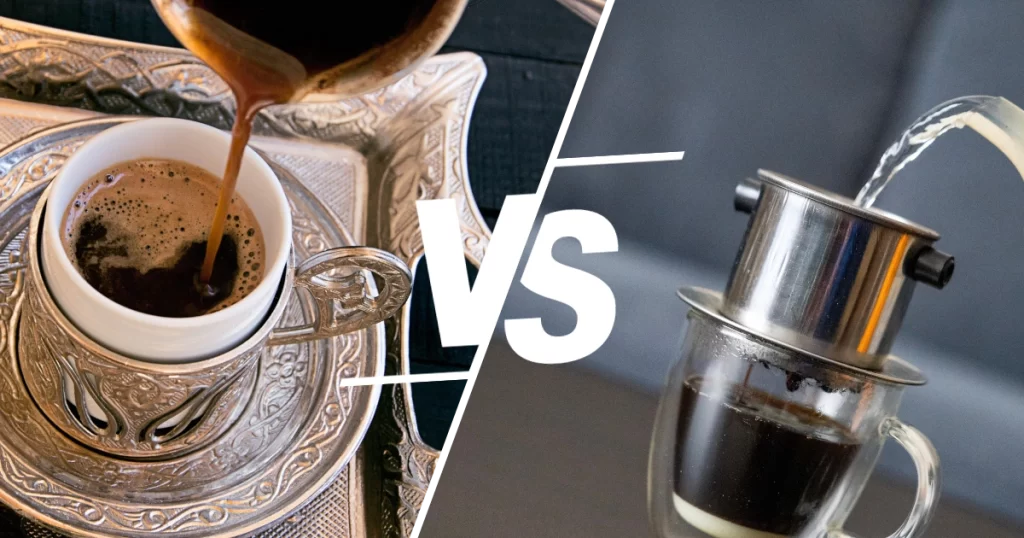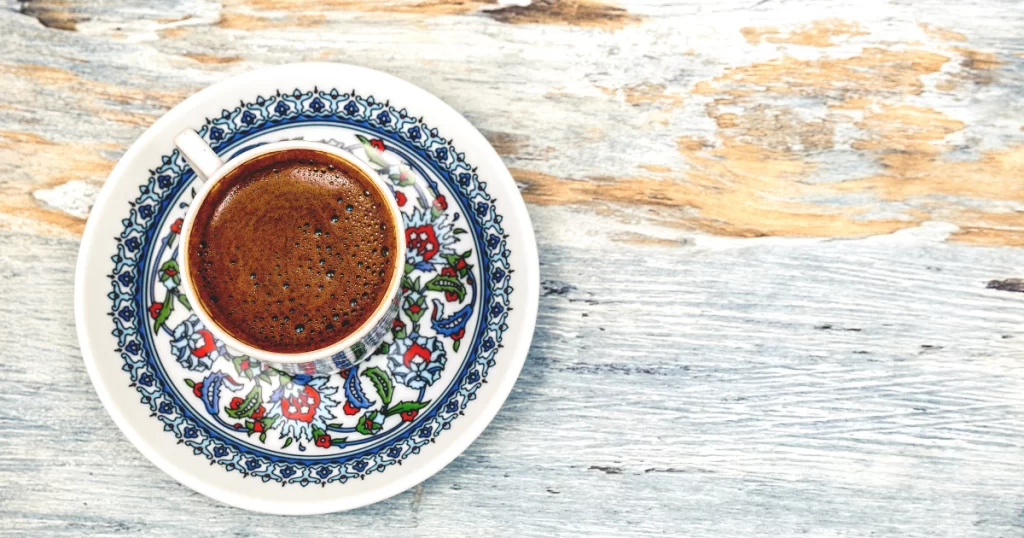Both Turkish coffee and Vietnamese coffee are strong brews. One of the strongest, actually. But what is the difference between them, and which one is better? Continue reading to learn all this.
💡 Check out what separates Vietnamese coffee from other coffee types.
Turkish coffee vs Vietnamese coffee – A quick overview
Turkish and Vietnamese coffee are completely different brews. From coffee beans and brewing to sweeteners and serving.
- Turkish coffee doesn’t use filters, and coffee grounds stay at the bottom of the cup. This gives a strong and gritty flavor that many people love but is also a challenge for some.
- Turkish coffee is sweetened with sugar, while Vietnamese coffee uses condensed milk to balance the intense flavors.
- Vietnamese coffee is prepared with dark roast Robusta coffee beans, while Turkish coffee is prepared with dark roast Arabica coffee beans. Because of the Robusta beans, Vietnamese-style coffee has a much more robust flavor.

Turkish coffee vs Vietnamese coffee – Coffee beans
Turkish coffee is typically made using Arabica beans, while Vietnamese coffee is made using Robusta beans.
Arabica beans are known for their delicate and nuanced flavors. They have a smoother taste profile with subtle notes. People often favor these beans for their complexity and acidity. In Turkish coffee, the use of arabica beans helps create a rich and aromatic cup with a well-balanced taste.
On the other hand, Robusta beans are known for their strong and bold flavors. They have a higher caffeine content and a more pronounced bitterness compared to Arabica beans. Robusta beans are often described as having earthy, nutty, and even woody flavors.
Pro tip: Because of the Robusta coffee beans, condensed milk pairs exceptionally well with Vietnamese coffee.
Traditionally, it is recommended to stick to using a specific type of beans for each brew to achieve an authentic and true taste. However, there can be exceptions to this rule. Some coffee drinkers may experiment with different types of beans to create unique flavor profiles.
While this can be interesting and enjoyable, it is important to note that deviating from the traditional beans may result in a different taste that may not be considered authentic.
Ingredients
Ingredients are the best measure of how traditional versions of both brews are different from each other.
Turkish coffee ingredients
- Extra-fine ground Arabica coffee
- Water
- Sugar
Vietnamese coffee ingredients
- Medium-ground Robusta beans
- Condensed milk
- Water
💡 Learn how Spanish latte and Vietnamese coffee are different, even if they have similar ingredients.
Preparation
Turkish coffee is prepared with a special pot called cezve. In this preparation method, coffee isn’t filtered out, but instead, you should allow it to settle down at the bottom of the cup.
For Vietnamese coffee, you should use a drip coffee maker, also known as a phin filter. This filter goes on the top of the cup or glass. Coffee is added to the filter, and water is poured over it. As hot water is extracting all the flavors, it slowly drips into a cup or glass below.

Strength
Vietnamese coffee is stronger than Turkish coffee. Usually, Vietnamese coffee has around 25 mg of caffeine per ounce of coffee, while Turkish coffee has approximately 16 mg of caffeine.
The reason for the strength of Vietnamese coffee isn’t because of the brewing process; instead, it lies in Robusta coffee beans. Even Arabica coffee beans have a smoother taste; they have almost half the caffeine than Robusta beans.
Final thoughts
Both Vietnamese and Turkish coffee are unique brews, both worth trying. Vietnamese coffee has a higher caffeine content and is sweeter, but Turkish coffee also packs a powerful coffee taste punch thanks to its unique brewing method.
My journey through renowned bars and coffee shops over five years, as a barista, coffee aficionado, and former bartender, has honed my pursuit for the perfect cup. My passion for coffee isn’t just about the brew—it’s about sharing the knowledge and insights I’ve gleaned along the way.



